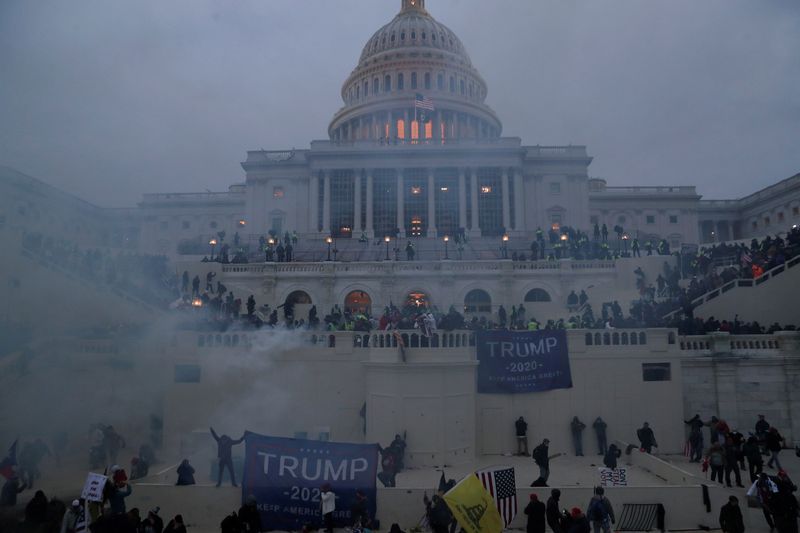By Jan Wolfe and Andy Sullivan
WASHINGTON (Reuters) - The U.S. House of Representatives is expected to vote on Tuesday to recommend "contempt of Congress" charges against former President Donald Trump's last chief of staff, Mark Meadows for refusing to cooperate with an probe of the deadly Jan. 6 storming of the Capitol.
Meadows has turned over some information to the committee probing the attack, but has declined to hand over other documents, arguing that they are protected because he worked for the president. He has also declined to appear for a deposition.
Meadows could become the third Trump associate to face a criminal contempt of Congress charge. The Justice Department, at the House's request, has already brought similar charges against Trump's former chief strategist, Steve Bannon. The House is also considering similar action against former Justice Department official, Jeffrey Clark.
Here's an explanation of the criminal charges Meadows could possibly face:
IS IT A CRIME TO DEFY A CONGRESSIONAL SUBPOENA?
Yes, an 1857 law says failure to comply with a congressional subpoena for testimony or documents is a misdemeanor, punishable by one to 12 months imprisonment.
This law, known as the "contempt of Congress" statute, outlines a process for the House or Senate to refer a non-compliant witness for criminal prosecution. The U.S. Justice Department then decides whether to bring criminal charges.
A final resolution could take time. Bannon's contempt trial is set to begin on July 18, just months before the Nov. 8 elections that determine control of Congress. If Trump's Republicans win back the House, they would have the power to dissolve the Select Committee the following January.
DOES CONGRESS HAVE OTHER OPTIONS FOR ENFORCING SUBPOENAS?
The Supreme Court said in 1821 that Congress has "inherent authority" to arrest and detain recalcitrant witnesses on its own, without the Justice Department's help.
But it has been almost a century since Congress exercised this arrest-and-detain authority, and the practice is unlikely to make a comeback, legal experts said.
During Trump's impeachment trials, senior Democratic lawmakers, including Representative Adam Schiff, discussed reviving this power, known as inherent contempt.
Instead of jailing recalcitrant witnesses, the House could issue daily fines, Schiff said in 2019. Democrats never followed through on that proposal.
WHAT ABOUT CIVIL LITIGATION?
The House sued recalcitrant witnesses during Trump's presidency in an attempt to get them to cooperate, but the court cases unfolded slowly. A lawsuit over whether the Internal Revenue Service (IRS) must hand over Trump's tax returns to a House committee has still not produced a single ruling on the merits.
Trump has filed a lawsuit to keep Jan. 6-related material private, but a federal appeals court rejected his claim on Dec. 9. He is expected to ask the Supreme Court to consider the case.

Meadows, who was a House member for more than seven years until joining the Trump administration in 2020, has also filed a lawsuit saying the chamber is overstepping its boundaries.
The Select Committee's chairman, Representative Bennie Thompson, says Meadow's lawsuit is baseless because he has already shared details about the Jan. 6 attack in a book.